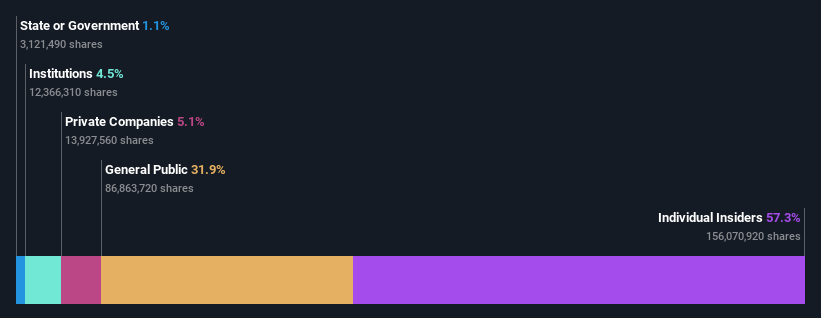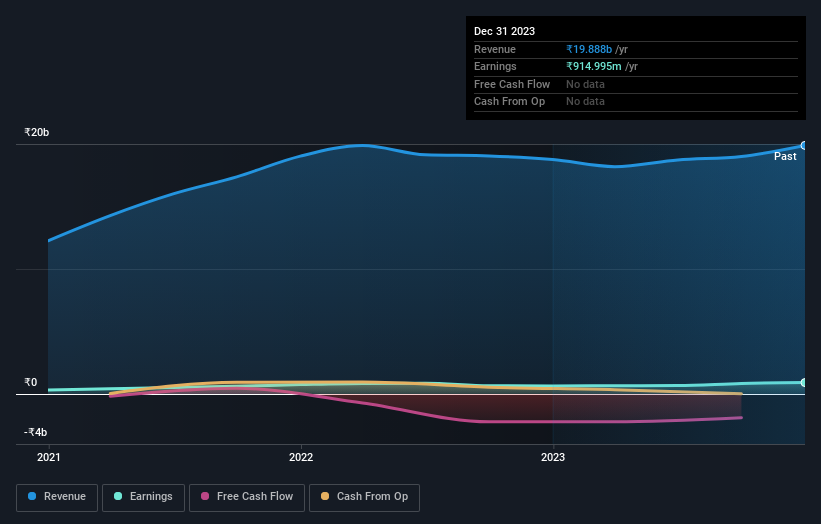BCL Industries Limited (NSE:BCLIND) CEO Rajinder Mittal, the company's largest shareholder sees 21% reduction in holdings value
Key Insights
- BCL Industries' significant insider ownership suggests inherent interests in company's expansion
- 54% of the business is held by the top 3 shareholders
- Using data from company's past performance alongside ownership research, one can better assess the future performance of a company
To get a sense of who is truly in control of BCL Industries Limited (NSE:BCLIND), it is important to understand the ownership structure of the business. We can see that individual insiders own the lion's share in the company with 57% ownership. In other words, the group stands to gain the most (or lose the most) from their investment into the company.
And following last week's 21% decline in share price, insiders suffered the most losses.
Let's take a closer look to see what the different types of shareholders can tell us about BCL Industries.
Check out our latest analysis for BCL Industries

What Does The Institutional Ownership Tell Us About BCL Industries?
Many institutions measure their performance against an index that approximates the local market. So they usually pay more attention to companies that are included in major indices.
Less than 5% of BCL Industries is held by institutional investors. This suggests that some funds have the company in their sights, but many have not yet bought shares in it. If the business gets stronger from here, we could see a situation where more institutions are keen to buy. We sometimes see a rising share price when a few big institutions want to buy a certain stock at the same time. The history of earnings and revenue, which you can see below, could be helpful in considering if more institutional investors will want the stock. Of course, there are plenty of other factors to consider, too.

BCL Industries is not owned by hedge funds. With a 21% stake, CEO Rajinder Mittal is the largest shareholder. For context, the second largest shareholder holds about 17% of the shares outstanding, followed by an ownership of 16% by the third-largest shareholder. Interestingly, the third-largest shareholder, Kushal Mittal is also a Member of the Board of Directors, again, indicating strong insider ownership amongst the company's top shareholders.
A more detailed study of the shareholder registry showed us that 3 of the top shareholders have a considerable amount of ownership in the company, via their 54% stake.
Researching institutional ownership is a good way to gauge and filter a stock's expected performance. The same can be achieved by studying analyst sentiments. Our information suggests that there isn't any analyst coverage of the stock, so it is probably little known.
Insider Ownership Of BCL Industries
While the precise definition of an insider can be subjective, almost everyone considers board members to be insiders. Management ultimately answers to the board. However, it is not uncommon for managers to be executive board members, especially if they are a founder or the CEO.
I generally consider insider ownership to be a good thing. However, on some occasions it makes it more difficult for other shareholders to hold the board accountable for decisions.
Our most recent data indicates that insiders own the majority of BCL Industries Limited. This means they can collectively make decisions for the company. Given it has a market cap of ₹16b, that means they have ₹9.0b worth of shares. Most would be pleased to see the board is investing alongside them. You may wish todiscover (for free) if they have been buying or selling.
General Public Ownership
The general public, who are usually individual investors, hold a 32% stake in BCL Industries. This size of ownership, while considerable, may not be enough to change company policy if the decision is not in sync with other large shareholders.
Private Company Ownership
Our data indicates that Private Companies hold 5.1%, of the company's shares. Private companies may be related parties. Sometimes insiders have an interest in a public company through a holding in a private company, rather than in their own capacity as an individual. While it's hard to draw any broad stroke conclusions, it is worth noting as an area for further research.
Next Steps:
I find it very interesting to look at who exactly owns a company. But to truly gain insight, we need to consider other information, too. For instance, we've identified 4 warning signs for BCL Industries (1 is significant) that you should be aware of.
Of course, you might find a fantastic investment by looking elsewhere. So take a peek at this free list of interesting companies.
NB: Figures in this article are calculated using data from the last twelve months, which refer to the 12-month period ending on the last date of the month the financial statement is dated. This may not be consistent with full year annual report figures.
Valuation is complex, but we're here to simplify it.
Discover if BCL Industries might be undervalued or overvalued with our detailed analysis, featuring fair value estimates, potential risks, dividends, insider trades, and its financial condition.
Access Free AnalysisHave feedback on this article? Concerned about the content? Get in touch with us directly. Alternatively, email editorial-team (at) simplywallst.com.
This article by Simply Wall St is general in nature. We provide commentary based on historical data and analyst forecasts only using an unbiased methodology and our articles are not intended to be financial advice. It does not constitute a recommendation to buy or sell any stock, and does not take account of your objectives, or your financial situation. We aim to bring you long-term focused analysis driven by fundamental data. Note that our analysis may not factor in the latest price-sensitive company announcements or qualitative material. Simply Wall St has no position in any stocks mentioned.
About NSEI:BCLIND
BCL Industries
An agro-processing and manufacturing company, engages in the edible oil, rice milling, grain-based distillery, and real estate businesses in India.
Adequate balance sheet second-rate dividend payer.
Market Insights
Community Narratives



